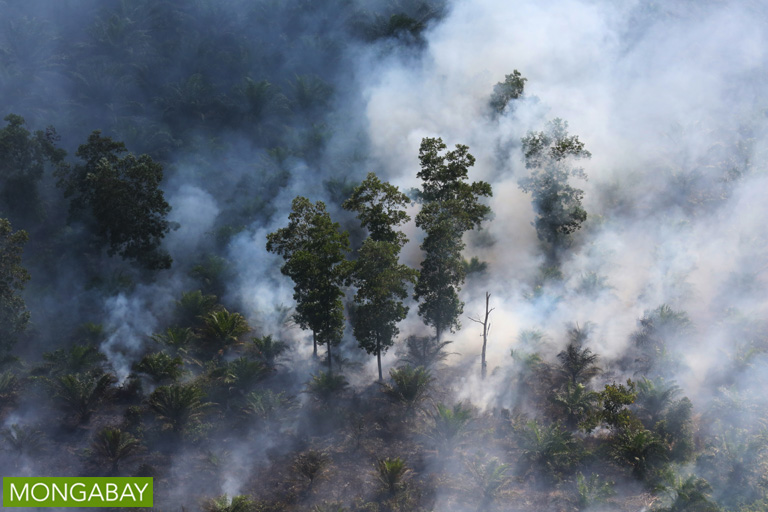- Indonesia’s vast peat swamp zones have been widely drained and dried for agriculture. The practice underlies the devastating annual fires that in 2015 burned an area the size of Vermont and sickened half a million people.
- Asia Pulp & Paper is Indonesia’s largest paper company. About a quarter of its vast holdings consist of peat.
- The government has banned any new development on peatlands. NGOs want the company to go farther, rewetting and restoring all of the peat in its concessions, even that which has already been planted with acacia.
International and Indonesian NGOs are calling on the country’s largest paper company to stop using drained peat swamps for industrial agriculture.
The practice, which relies on drying out the waterlogged soil so that acacia trees can be planted, has enabled vast new swaths of land to be opened for pulpwood production. But it also renders the soil vulnerable to haze-causing fires which each year sweep through the archipelago country, affecting the health of millions and sending greenhouse gas emissions skyrocketing.
The environmental groups want Asia Pulp & Paper (APP) not only to stop draining peatlands but also to phase out existing estates on peat, and then to rewett and restore those areas so that no more fires occur.
Such a move by APP would amount to a drastic restructuring of its entire business. The paper giant has planted more than 600,000 hectares (2,300 square miles) of peat, an area seven times the size of Singapore, according to a report by Wetlands International. That’s roughly a quarter of its entire land bank.
Further entrenching APP’s dependence on peat is its enormous new mill in South Sumatra province, on which the company quietly commenced operations in December.
The mill is one of the world’s largest. The NGOs say it could increase APP’s fiber demand by 73 percent, “[creating] added pressure to maintain and expand the system of industrial agriculture on drained peatlands that caused Indonesia’s devastating fires” in 2015, Lafcadio Cortesi, Asia director of the Rainforest Action Network (RAN), told Mongabay last year.

In response to the 2015 Southeast Asian haze crisis, Indonesian President Joko Widodo banned new clearance and drainage of peat, even within existing concessions. He also created an agency to restore 2 million hectares of damaged peat. But environmentally-minded members of his administration are still grappling with a powerful forestry lobby over how far the state may go to claw back peatlands that have already been planted.
One the administration’s edicts to come down in the wake of the 2015 fires forbid the replanting of burned peat. But a number of firms have proceeded to reestablish their ruined estates, earning the wrath of officials in Jakarta who say they are breaking the law.
APP is one of those to be implicated. The company has not responded substantively to allegations from the Ministry of Environment and Forestry that two of its units in South Sumatra, PT Bumi Mekar Hijau (BMH) and PT Bumi Andalas Permai (BAP), are replanting burned peat in violation of the government’s directive, although it has denied any wrongdoing.
The 2015 fires burned 37 percent of APP’s land in South Sumatra alone, including tens of thousands of hectares of peat in the two concessions mentioned above, according to a separate analysis by the Indonesian Forum for the Environment (Walhi), an NGO.
APP did retire 7,000 hectares of plantation located on peat in 2015. The company has suggested it may do the same elsewhere and it remains the only firm to have done so. But NGOs call that a drop in the ocean and continue to demand a more comprehensive overhaul of its operations.
APP is also experimenting with pulpwood species that can grow on rewetted peat, but the project has yet to bear fruit.
“The government must choose whether it will prioritize supplying wood to APP’s pulp mills, or enforce the rewetting and restoration of peatlands,” said Woro Supartinah, coordinator of the Riau Forest Rescue Network (Jikalahari). “We encourage the government to promote a broader set of interests than ensuring profits for one of Indonesia’s richest families.” APP is an arm of the Sinar Mas conglomerate, owned by the billionaire Widjaja family. “Restoring peatlands will generate economic growth and environmental security over the long-term.”
Asia Pacific Resources International Limited (APRIL) is the other big pulp and paper company in Indoensia. It too has drawn fire from NGOs who say it is creating the conditions for fire to spread.
The NGOs behind the recent statement are Eyes on the Forest (a coalition including WWF Indonesia, Jikalahari, Walhi Riau and other civil society organizations in Sumatra and Kalimantan), Rainforest Action Network, Hutan Kita Institute, Woods & Wayside International and the Auriga Foundation.
